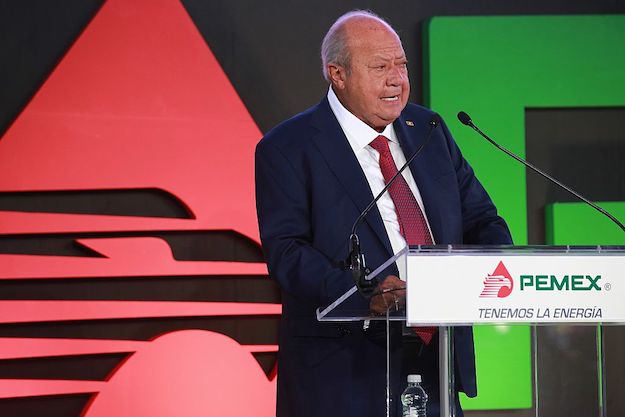This article has been updated
MEXICO CITY – Since entering office last year, Andrés Manuel López Obrador’s promise to crackdown on corruption has left many Mexicans asking a familiar question: When will it be Carlos Romero Deschamps’ turn?
The head of Pemex’s largest workers’ union since 1993, Deschamps, 75, has spent the last three decades parrying corruption accusations while amassing a personal fortune that reportedly includes a collection of Ferraris, property on Miami’s millionaire’s row, and enough money to support the jet-set lifestyle of his daughter and her three English bulldogs.
On Oct. 16, Deschamps stepped down as head of the union, citing “unfavorable conditions” and lack of cooperation between the workers and the administration of President Andrés Manuel López Obrador. The day before, López Obrador confirmed that his attorney general’s office would investigate the union leader over possible corruption.
In the court of public opinion, Deschamps is a symbol of impunity and old-style PRI politics – he allegedly helped funnel millions of dollars in Pemex money to the 2000 presidential campaign of Francisco Labastida Ochoa, part of a scandal now known as Pemexgate.
But in the court of law, accusations against Deschamps have failed to stick, whether due to insufficient evidence, legislative immunity (he’s served two terms as Senator and three in the lower house) or, as many claim, friends in high places. The Pemexgate investigations against him fizzled and were officially dropped in 2006. Deschamps has always denied any wrongdoing.
“The union has become a tool at the service of the government in power,” Ana Lilia Pérez, author of Pemex RIP, told AQ. “That’s why Deschamps has been able to stick around so long.”
But the current investigations against Deschamps are just the latest sign his luck – and the glory days of union-leader profligacy known locally as “charrismo” – may be running out.
On July 9, Deschamps’ lawyer, Juan Collado, was detained on corruption and organized crime charges while dining with the union boss at a Mexico City steakhouse. Two weeks later, newspaper Reforma reported that Mexico’s Financial Intelligence Unit (UIF) had prepared formal accusations against Deschamps and several family members for illicit enrichment and money laundering.
The head of the UIF quickly criticized what he said was a leak of “partly true, partly false” information, though the unit has recently been at the center of cases against other high-profile public figures, including Robles and former Pemex chief Emilio Lozoya. It was confirmed this week that the UIF has filed two complaints against Deschamps over alleged use of illicit funds.
Deschamps had also been facing pressure from within the ranks. A dissident group from the oil workers’ union presented what it said was evidence of his misconduct to the attorney general’s office in July. The group claimed Deschamps misappropriated funds and says he no longer has authority to lead the union – they took the mostly symbolic step of naming his replacement while the case is under review.
“Groups within the union have wrestled for years to get Deschamps removed,” said Pérez. “But the circumstances are different this time, first because of the UIF and second because he doesn’t have legislative immunity.”
Even so, Deschamps may find cover in Mexican law. A constitutional change in 2011 and justice reforms implemented in 2016 have given defendants wider recourse against state investigations. Deschamps has already used this to his advantage earlier this year, filing for a provisional suspension that, if nothing else, could drag out potential legal proceedings against him.
“The law now better protects defendants’ rights, which is as it should be,” Martín Vivanco, a Mexican lawyer and academic, told AQ. “But it also demands much more of authorities.”
That may help explain why the head of the UIF pushed back on this summer’s reports of his unit’s case against Deschamps. According to Vivanco, prosecutors would have a difficult time proving illicit enrichment or money laundering charges against the union boss, in the first case because he isn’t a public official and in the second because the union itself would have to prove that he had pilfered funds without their consent. Similar charges against former teachers’ union chief Elba Esther Gordillo were dropped last year due to insufficient evidence, after she had spent four years in prison awaiting trial.
“In Mexico if you say the word corruption, Deschamps would be one of the first names that comes to mind,” said Vivanco. “But big fish know exactly how the legal system works, and as reported the charges against him would be very hard if not impossible to prove.”
Still, government prosecutors are starting to catch up in using the reformed legal system to their advantage, Vivanco said. Cases against public figures like former social development secretary Rosario Robles – and against Deschamps, if one is forthcoming – will test Mexico’s revamped attorney general’s office in its ability to build cases that meet more rigorous legal standards.
Deschamps may also have fallen victim to a change in Mexico’s political environment since the election of López Obrador last year. López Obrador’s anti-corruption push has included cuts to public salaries and lay-offs state workers in what he calls a program of “republican austerity.” In that context, a failure to rein in the union boss would be a symbol of the ways the administration has fallen short.
“Much of López Obrador’s economic plan is based on reviving Pemex, and depends on workers’ performance and putting an end to things like theft from within the company,” said Pérez. “Deschamps’ continued leadership of the union doesn’t square with what the president says he’s trying to do.”
Some analysts suggested that earlier legal pressure, even if it didn’t end in any charges, could effectively have push Deschamps out the door. If the case against him proceeds – and is prosecuted thoroughly despite his resignation – it could signal a more serious push to discourage corruption elsewhere in government.
Such an outcome is far from guaranteed, despite the current investigation. But the old model of labor leader extravagance looks set to diminish, though perhaps not disappear, under the new regime. The union’s latest contract with Pemex, which took effect on Aug.1, includes a reduction from $75 million per year to $17 million in so-called Clause 251 funding, a type of slush fund for the union’s leadership committee used for everything from alcohol to anti-wrinkle cream.
López Obrador’s allies in Congress also recently helped pass labor reform designed to give individual workers more rights and offer union members more control over how they choose their leaders.
“The administration is trying to modernize Mexican labor,” said Ricardo Corona, judicial director at IMCO, a Mexico City think tank. “That doesn’t mean they’ll succeed, but if they are able to implement the labor reform as it’s written, it would could be a significant step forward for Mexico.”
This article was updated following Deschamps’ resignation on Oct. 16
—
Russell is a senior editor and Mexico City correspondent for AQ. Follow him on Twitter @BenPaulRussell








